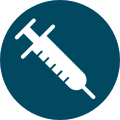Measles is a virus that can cause serious illness, especially in young children. Measles spreads easily from person to person. The virus can stay in the air for up to two hours after a person with measles coughs or sneezes. People who have had two doses of the MMR vaccine are at very low risk for getting measles.
Measles was rare in the United States because of widespread vaccination efforts. However, recent outbreaks in the U.S. and other countries have increased the risk for getting measles. No measles cases have been reported in Kitsap County since 2014.

Disease Information
Communicable diseases are diseases that spread between people or animals. Click on the buttons below to learn about specific diseases. For more disease information, visit the CDC's health topics index.

Our vision:
A safe and healthy Kitsap County for all.
Communicable Disease Data Dashboards
This report displays respiratory virus trends for Kitsap County based on data from healthcare facilities and laboratory testing. The Respiratory Illness Report is published weekly during respiratory illness season (typically fall and winter months) and published monthly when respiratory illness activity is low. You can subscribe to receive this report by email or text.
Measles cases & exposure locations in Washington state
Find the latest information about measles in Washington state from the Washington State Department of Health.
Preventing measles
Immunization is the best way to prevent measles. Check your immunization records and talk to a healthcare provider if you or a family member need a measles vaccine.
MMR vaccination for children
The MMR (measles, mumps, and rubella) vaccine is safe and provides excellent protection against measles. Two doses of the MMR vaccine are about 97% effective for preventing measles and the protection typically lasts for life.
In Washington, children are required to be vaccinated for measles before starting childcare, preschool, or kindergarten. Routine vaccines, including MMR, are free for children age 18 and younger.

Two doses of MMR vaccine are recommended for all children:
The first dose is recommended at age 12 to 15 months.
The second dose is recommended at age 4 to 6 years (before starting school or preschool).
If you are planning to travel to another country or state with a child younger than 12 months, talk to your pediatrician about recommended vaccines.
See our childhood immunizations page for more information.
Measles vaccination for adults
People who weren't vaccinated for measles as as children can get vaccinated at any age.
Many people born before 1957 immune to measles because they had measles when they were children.
Contact your healthcare provider if you are unsure if you have measles immunity.
More facts about the MMR vaccine:
The MMR vaccine is safe and effective for preventing measles, mumps, and rubella. The MMR vaccine has been carefully studied and tested.
Side effects from the vaccine are typically mild and go away quickly. Side effects can include pain or redness near where the vaccine was given, a fever, a mild rash, or achy joints.
Vaccines do not cause autism. Studies involving hundreds of thousands of children have found no link between vaccines and autism.
Symptoms of measles
Symptoms of measles include:
High fever
Cough
Runny nose
Red, watery eyes,
A rash that typically begins on the face and spreads down the body
Symptoms start a week to two weeks after a person becomes infected with measles.
Who is most at risk from measles?
Measles can cause serious illness, especially for young children. Severe complications from measles include pneumonia (infection of the lungs) and encephalitis (swelling of the brain). In the U.S., about one out of five unvaccinated people who get measles need to be treated in a hospital.
People at higher risk for severe illness from measles include:
Children younger than 5 years
Adults older than 20
People who are pregnant
People with weakened immune systems
People who have been vaccinated for measles have very low risk for getting measles.
How measles spreads
Measles is extremely contagious, meaning it spreads easily from person to person. When one person has measles, up to 9 out of 10 people who are close to them will also get infected if they do not have immunity to measles.
Measles most often spreads through the air when a person infected with measles coughs or sneezes. The virus can stay in the air for up to two hours. You can get measles just by being in a room that an infected person recently visited.
People who have been vaccinated for measles are at very low risk for getting measles.

Using a mobile device? These data dashboards cannot be viewed on a phone or tablet. Please visit this webpage from a computer.
Rabies Data
Measles
Healthcare Provider Resources
Looking for more healthcare guidance or resources? Visit our Provider Resources page.






.png)
